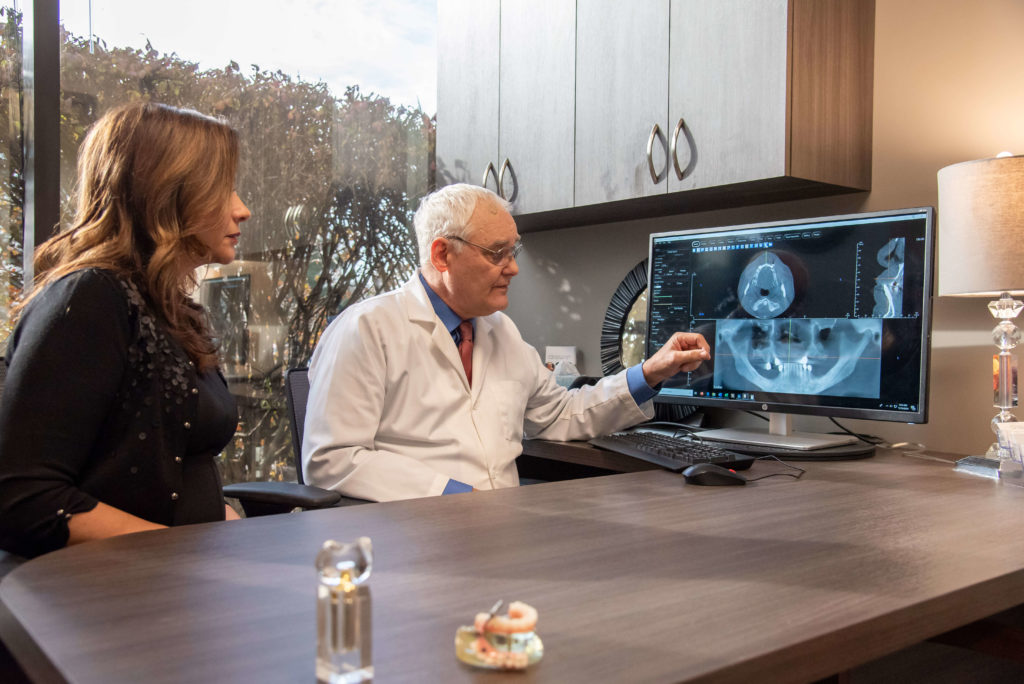What is a Periodontist?
By: Dr. Rajan Sharma

Most people visit their dentist every year for checkups and cleanings. However, not everyone needs the specialized care offered by periodontists. These dental health professionals diagnose and treat gum disease and bone loss. If your dentist refers you to a periodontist, they may have already noticed early signs of gum disease.
Gum disease occurs following a tooth infection. Bacteria accumulate, forming hard plaque that spreads under the gum line. The earlier you treat this condition, the greater your chances of avoiding advanced stages, characterized by receding gums, inflammation and a host of other oral health challenges. Learn how periodontists fit into your overall dental care.
What Does Periodontist Do?
We’ve already talked a little bit about the role of periodontists in your oral health care. It’s important to understand the difference between your family dentist versus these specialists. You’ll still go to your dentist for dental cleanings and general oral health issues. Additionally, dentists fix cavities and install crowns or bridges.
Periodontists focus on the structures that support your teeth, specifically your gums and jawbone. They also install dental implants and perform surgical and nonsurgical procedures on their patients. Your dentist may recommend that you consult with a periodontist if you need deeper cleanings than most patients, for example.
Common Procedures Performed by Periodontists
Periodontal maintenance and scaling and planing are the most common nonsurgical periodontal procedures.
Periodontal maintenance resembles regular dental cleanings. However, the hygienist will measure pockets around your teeth and pay close attention to your gum health. Bone loss related to gum disease can cause these pockets to get deeper, putting your teeth in jeopardy. Typically, periodontal maintenance appointments are performed every three to four months. They take longer than regular cleanings and include cleaning below the gum line.
Scaling and root planning require local anesthesia because the hygienist cleans deep under the gum line. This enables them to remove plaque and bacteria. The periodontist may also perform root scaling, which involves smoothing teeth roots to help prevent plaque buildup.
Surgical Procedures Performed by Periodontists
From gum grafts to laser treatments, periodontal surgeries strengthen the support structures of your teeth. Here are some of the most common periodontal surgeries:
- Gum Graft Surgery: Exposed tooth roots are particularly vulnerable to plaque and bacteria. Gum growth surgery covers exposed roots and helps reverse the effects of recession. Your doctor will take tissue from your palate or another source to prepare the graft. Along with improving your oral health, the surgery can have a positive effect on your smile.
- Regenerative Procedures: In some cases, the bone supporting teeth has succumbed to gum disease. This requires regenerative procedures performed by periodontists. Although the actual surgery varies depending on your specific needs, we can take a general look at what regenerative procedures may involve. The periodontist will carefully fold back the gum tissue to access and remove bacteria. They may insert membranes, tissue stimulating material or bone grafts to encourage further healing.
- Dental Crown Lengthening: This procedure removes excess gum tissue. By exposing the natural teeth, periodontists can achieve a positive cosmetic result.
- Periodontal Pocket Procedures: Pockets can form around damaged gum tissue; they make great places for bacteria to take root and thrive. During this surgery, the periodontist removes bacteria, treats the infection, secures the tissue, and shapes the bone to help prevent recurrences.
As you can see, there is a cosmetic element to periodontal care. Your periodontist will invite you to discuss your cosmetic and dental health goals prior to scheduling the procedure.

Benefits of Seeing a Periodontist for Gum Health
You may wonder if you would benefit from visiting a periodontist. To make your final decision, it’s important to understand the benefits of periodontal care in conjunction with regular dental care.
Universal benefits of periodontal care include the following:
- Improved smile: Your gums shape your smile and protect your teeth. Visit a periodontist to maintain a healthy, beautiful smile.
- Improved smile: Your gums shape your smile and protect your teeth. Visit a periodontist to maintain a healthy, beautiful smile.
- Plaque and tartar removal: Tartar and plaque accumulate along the gum line. Periodontal maintenance keeps tartar under control, preventing gum disease from developing or worsening.
- Fresh breath: Bacteria causes bad breath. Removing plaque and bacteria gives your breath an immediate boost.
Education and Training
Like regular dentists, periodontists attend four-year dental schools. Graduates receive a Doctor of Dental Surgery (DDS) or a Doctor of Dental Medicine (DMD). Next, aspiring periodontists attend an accredited school for three more years and take a written and oral exam approved by the American Board of Periodontology. For those specializing in specific niches, further training may be required.
Reasons to See a Periodontist
There are many signs and symptoms that indicate it’s time to call the periodontist. If you or your dentist notice that you have irritated, inflamed gums, you would likely benefit from seeing a periodontal specialist. The formation of deep pockets, bleeding gums, or excess plaque are additional reasons to add this medical professional to your contacts list.
Call a periodontist immediately if you notice pus or other signs of infection. Left untreated, gum and bone infections can affect more than your oral health. That’s why it’s important to detect and treat gum disease as early as possible.
Periodontists have a positive effect on your oral health. By reducing the spread and severity of gingivitis and periodontitis, these professionals help halt gum disease in its tracks.
What to Expect at the Periodontist
Typically, your dentist arranges a consultation with a periodontist. During the examination process, the periodontist we’ll examine your gums and jawbone. Based on their findings, they may recommend that you receive further diagnostic tests and evaluations. Once they have a full picture of your dental health, you’ll receive a customized treatment plan.
To optimize the results of your periodontal care, share any symptoms that you may be having, such as a toothache or signs of inflammation. During your initial consultation, the periodontist reviews your medical history and look for factors that can exacerbate or improve your oral health issues. Typically, they measure the depth of gum pockets to determine which areas require the most urgent care. The periodontist may also request x-rays to help identify potential bone loss.
Importance of Periodontal Care
With proper oral hygiene, you can prevent or reduce the severity of gum disease. Periodontal care can prevent gingivitis from becoming periodontitis, a condition that typically results in tooth loss and other oral health issues.
The longer you keep your teeth, the easier it is to maintain a healthy diet. Periodontists collaborate with hygienists and dentists to keep your teeth white, healthy and strong. You may even live longer by preventing infections that start in the mouth from damaging your heart.
Are You Ready to Schedule a Free Consultation?
Do you want to prevent periodontal disease and maintain good oral health? Contact EON Clinics Dental Implants today to learn more about our periodontal services, including dental implants.
